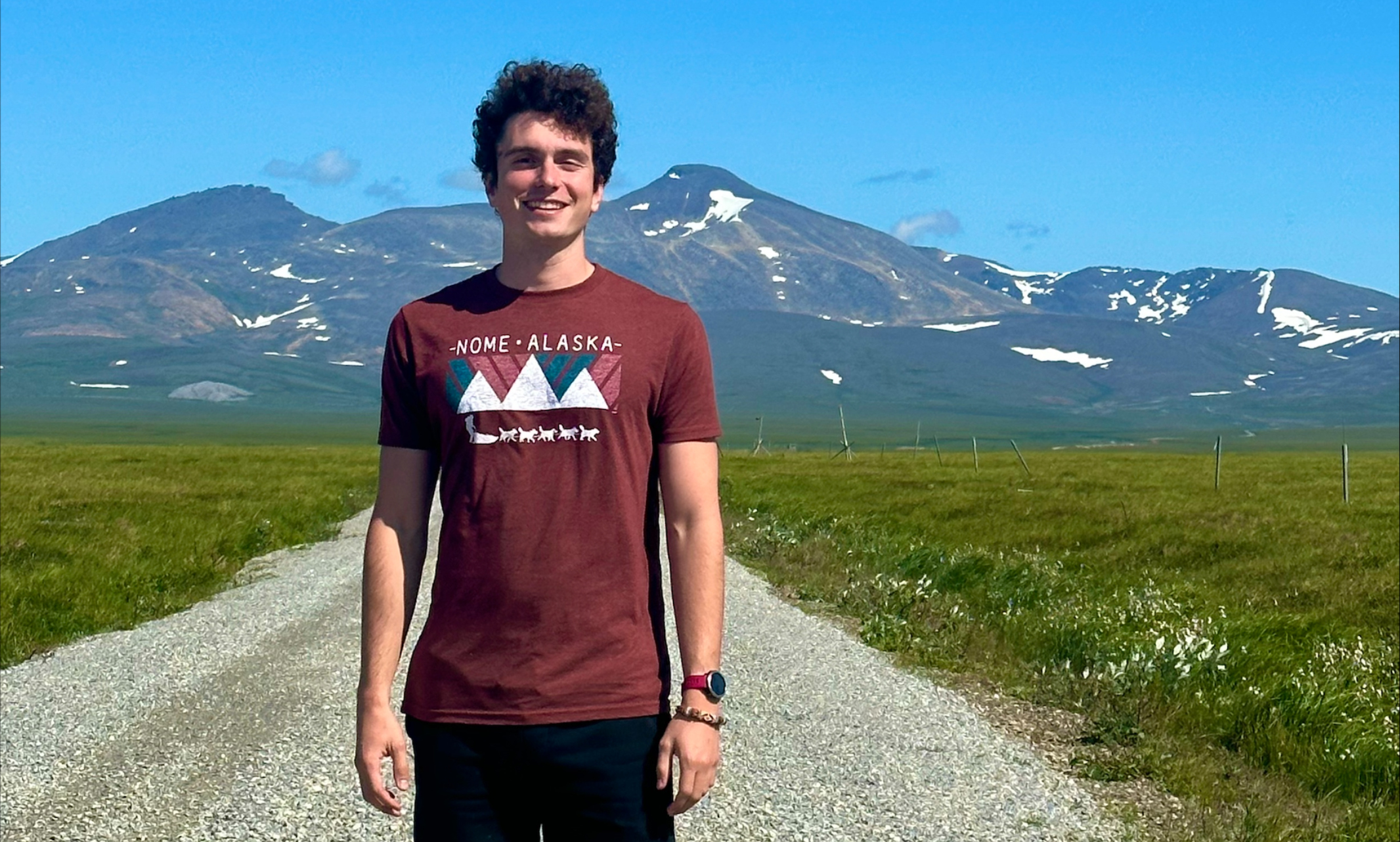Roos don't just dream, they do. Our students turn ideas into action every day. Get to know our people, and you'll know what UMKC is all about.
Caleb Feuerbacher
Anticipated graduation year: 2025
UMKC degree program: BA/MD, School of Medicine
Hometown: Maryville, Missouri
It took persistence, and Google Maps, for med student Caleb Feuerbacher to find the ideal place for a monthlong psychiatry rotation.
Norton Sound Health Corporation in Nome, Alaska, isn’t easy to spot from the lower 48. But it was a magnet for Feuerbacher, who has long dreamed of seeing the more remote regions of the world.
With three psychiatric rotations in easier-to-reach locations already on his resume, he decided in early 2023 it was time to go long.
“I just started clicking on hospitals that showed up on Google Maps in remote areas of Alaska,” he said. He found Norton Sound in Nome, went to the website and discovered that they already had a medical student rotation program established with Tulane University. The website included a name and phone number for a contact person for the program. He picked up the phone and called.
“The man said, ‘We’re having a Zoom meeting tomorrow with applicants from Tulane. Want to join?’ And I did.”
On June 23, he stepped off the plane and into another world. For the first two weeks, the sun never set.
“The culture is rooted in subsistence hunting,” he said. “The people are all super nice and friendly. They were always inviting me into their homes.” He spent a lot of his free time exploring and sightseeing in the tundra and mountains.
He also encountered professional challenges.
“According to the CDC, the suicide rate in Alaska is about 1.5 times that of Missouri,” Feuerbacher said. “I don’t think the issue is as simple as remoteness or weather. There’s been a lot of challenges for Native Americans and Alaska Natives with European colonists from the very beginning. Many challenges continue to exist today.”
His thinking is influenced by more than just a month in Alaska. He spent an earlier rotation in a place much closer to Kansas City, but almost as remote: White Cloud, Kansas, population 115, in the reservation of the Iowa Tribe of Kansas and Nebraska, where he dealt with similar issues.
“I think it is really important for medical students, or really anyone, to learn more about native Americans and Alaska natives, to see things from their perspective.”
“I really like the extremities of the world. I like to explore things that few people in the world have seen, see how other people live. I want to experience other cultures, other lifestyles.” —
What’s next for Feuerbacher? He will spend the 2023-2024 academic year at Harvard pursuing a master’s degree in public health, then return to UMKC for the final year of medical school. Then a residency, and eventually a psychiatric practice.
Just where that will be remains to be seen. Utqiagvik, Alaska (formerly Barrow), one of the northernmost towns on the planet, is on his bucket list. He’s also eager to visit U.S. territories in the Pacific, such as Guam and the Northern Marianas.
“I really like the extremities of the world,” Feuerbacher said. “I like to explore things that few people in the world have seen, see how other people live. I want to experience other cultures, other lifestyles.”
“I think it’s really important to see how medicine is practiced in different areas of the United States,” he added. “I believe it helps you understand on a deeper level the issues you’ll be dealing with in your practice.”
Why did you choose UMKC?
I visited it as a high school student. It had a great campus and was close to home, along with the program I wanted and great support.
Why did you choose your field of study?
The six-year BA/MD program was perfect for me as it was in-state and gave me admission into a great medical school.
What are the benefits of the program?
Getting your M.D. and undergrad degree in only six years, with lower cost than most other medical schools for in-state students. The students here are awesome, and I’ve met a lot of friends on campus. I also like the flexibility on choosing away rotations.
Who do you admire most at UMKC?
Dr. Wacker (Michael Wacker, Ph.D., associate professor and associate dean - Academic Affairs, vice-chair, Biomedical Science) has been an amazing role model and person to seek guidance from, especially for rural/away rotations.
Do you have any scholarships?
I am on an athletic scholarship for NCAA Division I cross country. I ran competitively here at UMKC for three years with my last season being this past fall, and was UMKC’s third-fastest cross country runner this year at conference.
What’s your favorite social media channel?
Geowizard on Youtube. He’s a funny personality and has lots of cool videos about challenges where he walks across countries in straight lines and loves geography, which I love as well.
What’s your favorite spot on campus?
Bloch Executive Hall; there are lots of little places to explore in that building.

